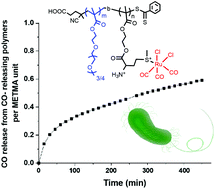Carbon monoxide (CO) is being increasingly appreciated as a major physiological gasomediator and plays significant roles in different biological activities. However, site-specific delivery of this toxic gas faces major difficulties in the healthcare system in terms of unavailability of appropriate equipment for delivery. A well-known and most studied carbon monoxide releasing molecule (CORM) is tricarbonyldichlororuthenium(II) dimer (Ru2Cl4(CO)6). However, its use as a therapeutic agent is restricted due to its poor water solubility and a short half-life. In order to solve this issues we have designed and synthesized a water-soluble methionine (methionine methacryloyloxyethyl ester (METMA)) and poly(ethylene glycol methyl ether methacrylate) containing block-copolymer via reversible addition–fragmentation chain transfer (RAFT) polymerization and attached the CORM in the methionine side chain units. Inductively coupled plasma optical emission spectrometry (ICP-OES) and FT-IR confirms the presence of CORM molecule into the polymer. The time-dependent CO release from CORM conjugated block-copolymer was investigated by a myoglobin assay. This CORM conjugated block-copolymer slowly and spontaneously released CO with sustained-release kinetics. Moreover, this CO-releasing polymer was able to prevent biofilm formation against Pseudomonas aeruginosa.
